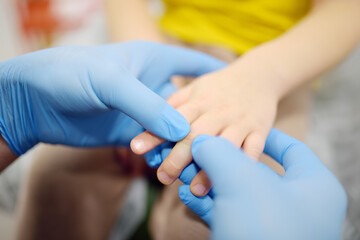As a pediatrician at ONP Hospitals, I’ve witnessed countless stories of resilience and recovery, but one case stands out—little Anaya’s story. Anaya, a spirited four-year-old, came to us after a severe finger injury that happened while she was playing in the backyard....
Here Are Some Monsoon Care Tips During Pregnancy

Bliss of Monsoon
Here are some suggestions that can help you enjoy the bliss of monsoon while you’re pregnant and make you feel better during the change of season.
Right Choice of Clothes
Being pregnant during summers can be a frightful experience, especially with excessive sweating. Regrettably, monsoon is likely to make you sweat more since the level of humidity increases tremendously during this season.Choose clothes that are lightweight and keep you comfortable and cool (preferably cotton). Synthetic fabrics are a big NO since they retain heat and perspiration and may cause rashes and prickly heat.Avoid wearing uncomfortable, body-hugging clothes, especially when you have a big tummy.
You should also be careful about the shoes you wear. Buy some supportive shoes if the roads are slippery or waterlogged. Avoid rubber-soled shoes or slippers as they can slip on wet surfaces. Working women should carry an extra set of clothes since it can be of great help at hand if you get drenched.
Healthy Food
Monsoon is the time when you need to be very precautious ( cautious ) about your diet and food intake. Staying hydrated is essential, even during the rains. Drink plenty of water (only filtered), coconut water, homemade lemonade, or juices packed in tetra packs. Avoid food served by roadside vendors, like raw chopped vegetables and cut fruits (they have a tendency to absorb moisture too fast making them an ideal environment for bacterial growth), juices, snacks, and water or milk-based drinks. If you must eat out, choose a place that is known for its cleanliness and hygiene.
Boost your immunity levels by eating more home-cooked food. Use filtered water to cook, knead the dough or wash the meat you want to cook. Raw eggs and seafood should essentially be avoided during monsoons. Be extremely careful with foods like prawns and fish as this is the breeding season for them. Raw fish and sushi are a big NO. Try taking a balanced diet and incorporate a lot of protein sources to congregate your body’s requirements during the rainy season.
Make it a ritual to clean leafy green vegetables several times over in filtered boiled water and steam them to get rid of any germs and bacteria. Be careful with green leafy vegetables like cabbage, spinach, and cauliflower because of the presence of dirt, mud, and worms. If you wish to consume them make sure you blanch them thoroughly and wash them in salt water.
High Hygiene Habits
Keeping yourself fresh and clean during monsoons is a must. You should bathe at least twice in a day. A neem water bath during this season will greatly help pregnant women deal with the stickiness in the air and will leave your skin smooth and free of rashes. All you have to do is boil a handful of neem leaves for 15-20 minutes and then add them to your bath water. After a shower, dry yourself well.
Keep your clothes, footwear, socks, raincoat, etc. clean and make sure that they are dried immediately and free of all moisture else they will become a breeding ground for germs and moulds. Make sure you keep wet tissues or towels dipped in cool water handy so you can use them whenever you want to wipe sweat and grime away. Wash your hands and feet regularly with lukewarm water and a disinfectant soap to keep them clean and shield against infections. Keep your nails clean by preferably cutting and trimming them regularly.
Clean Home
Monsoon is often marked by the outbreak of many diseases, which either are waterborne or spread through mosquitoes. Therefore to have a complication-free pregnancy, ensure that you keep the home clean and fresh. Using a high disinfectant to clean the floors and washrooms is a must.
To protect your home from flies, mosquitoes, cockroaches, termites, and other diseases, use a pest control. Use grandma’s trick – keep a small mesh bag of cloves near your window or in your cupboard to let the fresh natural scent fill up the air around you. Burning camphor, incense sticks, therapeutic oils, or neem leaves will also help purify the air and enliven your spirits.
- Use mosquito repellant since mosquito population rises in stagnant water
- Food and water-borne diseases increase during the monsoons.
- Strictly do not eat street food or raw food outside. Filtered water is a must.
- Hepatitis A virus, which causes jaundice is transmitted through water and food. Jaundice in pregnancy can be very dangerous and life-threatening
- Typhoid is also transmitted through water and food. Typhoid can create complications in pregnancy.
- Acute gastroenteritis ( diarrhea and vomiting ) caused by bacteria and viruses in water and food can have serious effects on pregnancy. It may warrant hospitalization because of dehydration.
- When walking on the road, be extra careful. Because if you slip and fall the trauma can lead to premature delivery and other problems in pregnancy.
- When walking on the road, keep a watch for open wires etc because water can trigger short circuits and can be very dangerous
About Author
More Blogs
Addressing Childhood Obesity: Preventative Measures and Healthy Lifestyle Choices
Childhood obesity is growing concern. More kids...
Healthy Sleep Habits for Children: Tips for Parents
Good sleep is essential for children’s health...
The Role of Diet and Nutrition in Managing Encopresis in Children: Insights from Dr. Amita Phadnis
Encopresis, a condition characterized by...
Videos
Dr. Amita Phadnis’s Full Speech on Survival & Health Rights at UNICEF India.
Dr. Amita Phadnis ,M.D., Gave a Motivating Speech
Breast cancer is cancer that forms in breast cells. Women are mostly diagnosed with this cancer. Although it can be seen in both men and women
What is AMH
The granulosa cells in your ovarian follicles create the anti-Mullerian hormone, often known as AMH. According to the American College of Obstetricians and Gynecologists (ACOG), the generation of AMH is a reflection of your ovarian reserve.
FAQ’s
Pregnancy and Migraine Headaches: What Women Need to Know
When you are pregnant or breastfeeding, then...
What Is the Problem of Orthopedics in Children?
While orthopaedic problems are commonly seen in and associated with the elderly, it’s important to be alert regarding the fact that they can afflict young people and children as well.
All You Need to Know About Reproduction
Most science students have to study about reproduction in their high school syllabus, and some learn from their parents, who may discuss it even earlier. It’s a very good thing to know about our own bodies…




 Home
Home Blogs
Blogs



